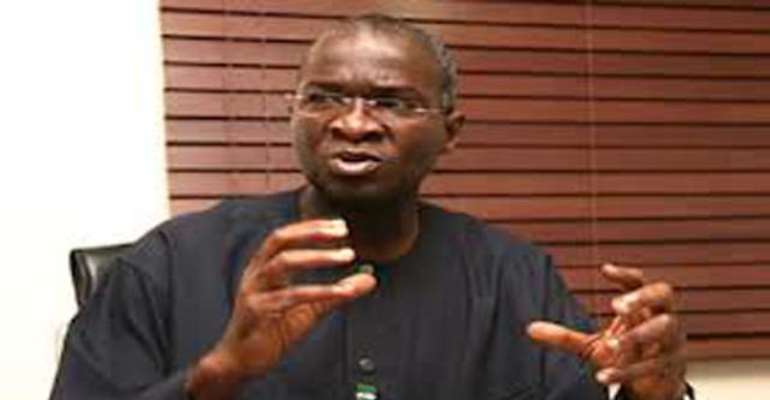States and federal waterways law – Punch

Lagos State suffered the full brunt of the federal might recently when the National Inland Waterways Authority insisted that Governor Babatunde Fashola required a permit from the agency before Lagos could 'develop municipal water transportation' in the state. Sounding indignant - and rightly so but not legally so - Fashola argued that Lagos did not need a NIWA permit to develop projects that could 'bring development to the people.' The governor forcefully argued, 'I find it objectionable where NIWA asks me to come to it and obtain a permit to set up a jetty in my own lagoon….'
This is a constitutional problem. At issue here is the legalism that has been preventing the 36 states of the federation from embarking on developmental projects because of the federal/state dichotomy encapsulated in the exclusive and concurrent lists spelt out in the constitution. The basic law authorises only the Federal Government to have power on the items in the exclusive list; the Federal Government and states have the power to legislate on the items in the concurrent list and where laws clash, the federal ordinance takes precedence. One of the items on the exclusive list is the management of waterways that flow into more than one state and the NIWA law that follows from it. As CAP47LFN (formerly Decree No. 13 of 1997), the enabling waterways Act states, 'the power of exclusive management, direction and control on the Nigerian Inland Waterways' is vested in NIWA. To worsen the case, NIWA too is adamant. Citing the superiority of federal laws over state laws, NIWA said, 'The most respectable and honourable pathway therefore is to obey the laws of the Federation, as validly prescribed until there are amendments and/or repeals by the National Assembly, or pronunciation by courts of competent jurisdiction.'
That may be the position of the law. But things must not be allowed to degenerate further between two tiers of government that claim separately to have the sole aim of providing development to the citizens. As many states, including Lagos, have discovered, their inability to operate the items on the exclusive list has curtailed their development drives. Examples abound of how the exclusive list provision hampers states from providing infrastructure to their citizens. One of them is the issue of federal roads passing through the states. Many federal roads in different parts of the country are terribly bad because Abuja is far away from the grass roots.
A few years ago, a needless battle raged between Lagos State and the Federal Government over the reconstruction of the Lagos-Badagry Expressway, a federal highway. Although Lagos had awarded a contract for the expansion, the then Minister of Works, Hassan Lawal, insisted that Lagos had no right to do so, saying the Federal Government would 'take over the road.' Similarly, a battle is currently raging in the Federal High Court over whether Lagos State has the right to construct the suspension bridge linking the highbrow Lekki and Ikoyi, which is aimed at reducing the traffic snarl in the area, because the waterway it traverses is controlled by the Federal Government. This is unnecessary bickering and a drawback to development.
Many of the 36 states had spent billions of naira on reconstructing federal roads in their domain in order to ease transportation for their people. Yet, the Federal Government refuses to grant them permission to do more. And where permission is reluctantly granted, states are often not reimbursed for what they might have expended on the projects. The Federal Government is reportedly indebted to 10 states, including Lagos, Akwa Ibom, Cross River, Kwara and Abia to the tune of N442.6 billion for the federal roads they repaired in the domains. There is slim hope that those states will ever get their full funds back. According to Mike Onolomemen, the Minister of Works, the Federal Government can only reimburse states if the roads they reconstructed are gazetted in the 1973 Highway Act.
Recently, Ogun State had a running battle with the Federal Government over the former's attempt to repair some terribly bad portions of the Lagos-Ibadan Expressway (a federal road). While the two governments bickered, the road became worse, inflicting hardship on the electorate that voted the governments into power. If the two tiers of government truly had the interest of the people at heart, things shouldn't have degenerated to a crippling disagreement between them.
So, what to do? The Federal Government cannot effectively manage the long list of 68 items on the exclusive list, but holds on to them at the detriment of the states that want to develop their territories. There are only 24 items on the concurrent list. Governor Abiola Ajimobi of Oyo State said, 'We need to review our Constitution to grant responsibilities that are best performed at state level to the states.'
The Federal Government and its agencies must make a distinction between the letter of the Constitution, and the spirit of the Constitution. While the letter demands that the law be followed wholly, the spirit of the law is flexible enough to accommodate cogent issues that can benefit the wide populace. This is one of the reasons the late President Umaru Yar'Adua granted Lagos State permission to construct the Lekki suspension bridge. Permission should be readily granted to willing states as long as the federal specifications and standards are met.
Even after the altercation between former President Olusegun Obasanjo and then Governor Bola Tinubu of Lagos, the former president did the right thing to grant Lagos the right to use a section of Ikorodu Road (a federal facility), for its Bus Rapid Transit Scheme. President Goodluck Jonathan should use his office to espouse the spirit of collaboration between the government at the centre and the states.
